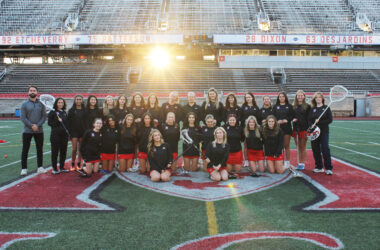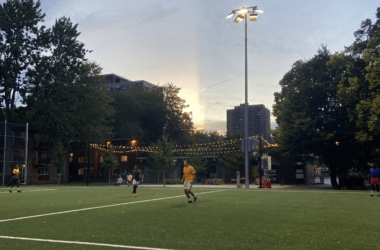Sometimes sports are just sports. Like the Super Bowl this weekend, they can be fun to watch and don’t mean much. Sometimes though, sports serve as a platform for a greater cause. I’m reminded of this because the day before the Super Bowl, February 5, was the one-year anniversary of Brendan Burke’s tragic and untimely death. Burke died skidding on an icy Indiana road and crashing into an oncoming Ford truck, but his unique and unusual legacy is still felt strongly in the National Hockey League community and beyond.
Burke was a varsity goaltender in high school, but quit the team before graduation. He went on to become the student manager of the University of Miami hockey team. Until November 2009, his only real claim to widespread hockey fame was as the son of the more famous Burke: Brian, the current GM of the Maple Leafs and architect of the 2007 Stanley Cup winning Anaheim Ducks.
Brendan became famous in his own right, partly still due to his connection to his father, but also as a gay advocate in hockey. Growing up in the world of hockey, which can be a homophobic culture at times, Brendan quit his high school team for fear his teammates would find out he was gay. Since coming out in his sophomore year at the University of Miami and finding tremendous support from both his family and hockey team, Brendan decided to spread his story.
Brendan’s efforts, impressive as they were, won’t be remembered in the same way as Jackie Robinson breaking the colour barrier or Muhammad Ali declaring himself a pacifist, simply because Burke was no star of the game. But for every Robinson, for every Ali, there’s a precursor, someone of lesser stature who paves the way forward. In baseball, 60 years before Robinson took the field, there was Moses Fleetwood Walker, a middling catcher for the now-defunct American Association, the real first African-American to play professional baseball.
Still, Burke’s experience and the media reaction it spawned shows that the time for another watershed moment in sports is drawing near. Soon, there will likely be an openly gay athlete in one of the “Big Four” (NHL, MLB, NBA, and NFL). And, even though hockey is behind in many ways (no retired hockey player has ever come out, the locker room culture is often perceived as homophobic), my money is still on the NHL, Canada’s league, to produce the first.
There have been numerous gay athletes in baseball, hockey, football, and basketball, and some have even come out publicly after retiring, but none were openly gay during their playing careers. Glenn Burke, no relation to Brian and Brendan, the man known for popularizing the high-five after home runs in baseball, has said that both his teammates and team management were aware of his sexual orientation, and that this played a role in prematurely ending his career. Still, it’s unclear in Glenn’s case to what degree knowledge of his sexuality was public.
It’s possible that a hockey player will go much further than Glenn Burke ever did, and will come out, not only to teammates and management, but to the entire media circus. It’ll be tough to do, and only a superior player or a person of superior character will be able to do it—the former because he won’t have to fear losing his job, and the latter because he’ll take the risk for a greater cause. Hockey players, for all their “pugnacity, testosterone, truculence, and belligerence” are still mostly Canadian kids. And my assumption for Canadians is a higher degree of tolerance than found elsewhere. As recently out journalist Steve Buckley said in an interview with The Good Men Project, “[R]eading all these emails in the last couple weeks, everybody’s got a lesbian sister. Everyone’s got a nephew who is gay. Everyone’s got somebody in their lives who’s gay. And it’s not a question. People say, ‘Well, can a Major League baseball player be out? Would his teammates accept him?’ And that misses the point. It’s not a question of whether those teammates will accept him. It’s a question of whether those teammates have already accepted other people in their lives who are gay or lesbian or transgendered.”
Furthermore, Sean Avery, widely regarded as one of the bigger meatheads in professional hockey, has expressed on record his solidarity with any youths who love hockey but are afraid to come out to their teammates. If Avery can show this kind of tolerance, anybody can. I have a lot of faith in Canada, and in hockey as a result, to follow in the trail Brendan began to blaze and bring down the next major prejudice in sports.








